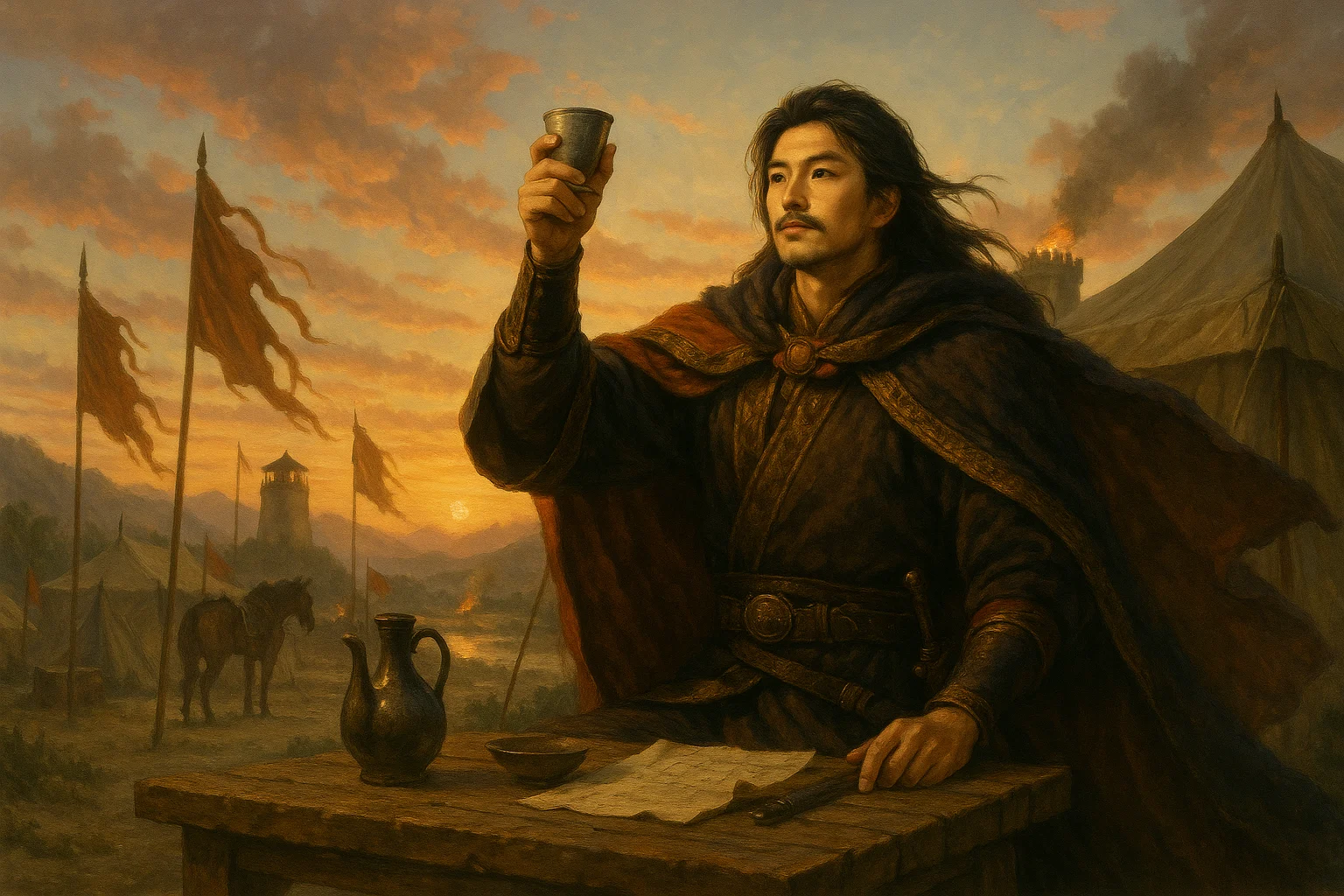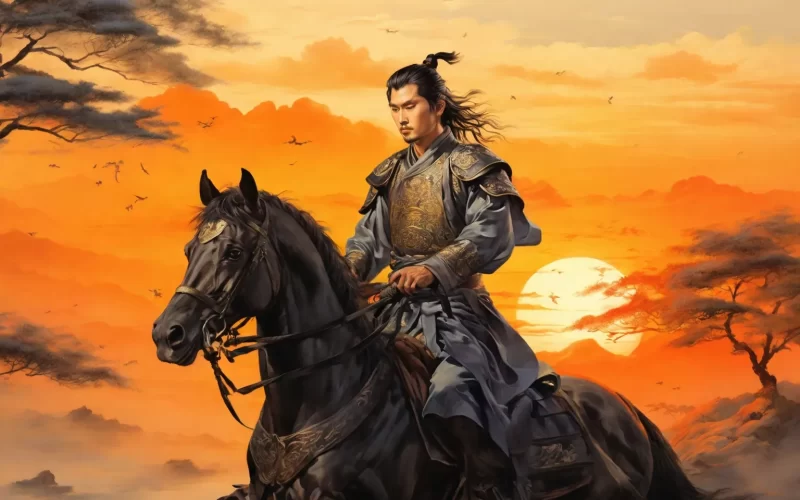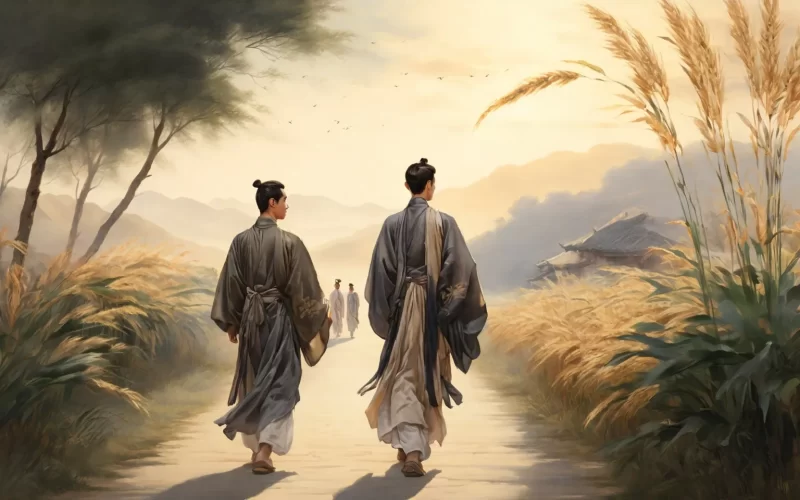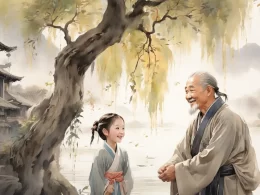There once was a man, sent on military missions,
A wanderer, from youth, on the Yu and Yen frontiers.
Under the horses' hoofs he would meet his foes
And, recklessly risking his seven-foot body,
Would slay whoever dared confront
Those moustaches that bristled like porcupine-quills.
…There were dark clouds below the hills, there were white clouds above them,
But before a man has served full time, how can he go back?
In eastern Liao a girl was waiting, a girl of fifteen years,
Deft with a guitar, expert in dance and song.
…She seems to be fluting, even now, a reed-song of home,
Filling every soldier's eyes with homesick tears.
Original Poem
「古意」
李颀
男儿事长征,少小幽燕客。
赌胜马蹄下,由来轻七尺。
杀人莫敢前,须如猬毛磔。
黄云陇底白云飞,未得报恩不能归。
辽东小妇年十五,惯弹琵琶解歌舞。
今为羌笛出塞声,使我三军泪如雨。
Interpretation
This poem portrays adolescent soldiers' frontier experiences, capturing both their martial valor and homesick longings. Likely composed during the Tang dynasty's frequent wars, it reflects the era's conscription realities through contrasting images of battlefield heroism and borderland melancholy.
First Couplet: "男儿事长征,少小幽燕客。"
Nán ér shì cháng zhēng, shào xiǎo Yōu Yān kè.
True men march to distant campaigns, I've been You-Yan's guest since youth remained.
The opening establishes youthful conscription. "Distant campaigns" (长征) emphasize war's protracted hardships, while "You-Yan guest" (referring to the volatile northern frontier) implies premature military service.
Second Couplet: "赌胜马蹄下,由来轻七尺。"
Dǔ shèng mǎ tí xià, yóu lái qīng qī chǐ.
We gamble with life under hooves' crush, Never treasuring our seven-foot hush.
These lines showcase the soldiers' fatalistic courage—treating survival as dice throws, embodying the Tang martial ethos that prized glory over self-preservation.
Third Couplet: "杀人莫敢前,须如猬毛磔。"
Shā rén mò gǎn qián, xū rú wèi máo zhé.
None dare approach when we fight, Beards bristling like porcupines in might.
The vivid porcupine simile (猬毛磔) animates their terrifying battle frenzy, with erect facial hair symbolizing combative ferocity.
Fourth Couplet: "黄云陇底白云飞,未得报恩不能归。"
Huáng yún lǒng dǐ bái yún fēi, wèi dé bào ēn bù néng guī.
Yellow clouds cloak Long's plains below, White clouds drift—no homecoming till debts I owe.
This pivotal couplet shifts from valor to obligation. The colored clouds (黄云, 白云) metaphorize divided loyalties between frontier duty ("yellow" representing imperial authority) and hometown yearning ("white" suggesting purity of domestic life).
Fifth Couplet: "辽东小妇年十五,惯弹琵琶解歌舞。"
Liáodōng xiǎo fù nián shí wǔ, guàn tán pípa jiě gē wǔ.
A Liaodong maiden of fifteen years, Skilled in pipa's songs that conquer fears.
The introduction of a frontier entertainer (辽东小妇) injects exoticism while foreshadowing the emotional climax. Her youth parallels the soldiers' own premature conscription.
Sixth Couplet: "今为羌笛出塞声,使我三军泪如雨。"
Jīn wèi qiāng dí chū sài shēng, shǐ wǒ sān jūn lèi rú yǔ.
Now her Qiang flute plays "Frontier's Call," Drenching three armies' cheeks like fall.
The mournful Qiang flute (羌笛), playing the classic "Exiting the Frontier" tune (出塞声), triggers cathartic weeping. This musical epiphany dissolves martial stoicism, revealing universal homesickness beneath the warrior facade.
Comprehensive Analysis
The poem masterfully oscillates between yang energy (martial prowess) and yin vulnerability (nostalgia). Its structural brilliance lies in using the pipa maiden as a pivot—her performance bridges the soldiers' external ferocity and internal tenderness. The "three armies weeping" (三军泪如雨) finale transcends individual experience to depict collective psychological rupture.
Artistic Innovations
- Dualistic Characterization: Warriors are both "porcupine-bristled" killers and tearful adolescents—a psychological realism rare in frontier poetry.
- Sensory Layering: Tactile (bristling beards), auditory (flute songs), and visual (color-coded clouds) details create immersive verisimilitude.
- Musical Catharsis: The Qiang flute's cultural resonance (associated with border melancholy) transforms the poem into a musical composition where sound unlocks suppressed emotion.
Insights
Beyond recording Tang military life, the poem interrogates the Confucian soldier's paradox: Can one truly "serve the ruler with loyalty" (报恩) while severed from familial roots? The weeping armies suggest that even the most disciplined warriors remain fundamentally human—a reminder that all nationalistic narratives ultimately unravel at the personal level.
About the Poet

Li Qi (c. 690 - 753 AD) . A renowned Tang dynasty poet, Li Qi traced his ancestral roots to Zhao Commandery (present-day Zhao County, Hebei) but resided primarily in Yingyang (modern Dengfeng, Henan). Li Qi excelled in five- and seven-character verse forms, particularly frontier poems and musical poetry. He maintained close friendships with literary giants like Wang Wei, Gao Shi, and Wang Changling, later being grouped with them as one of the "Four Masters of High Tang" (Gao, Cen, Wang, and Li).












